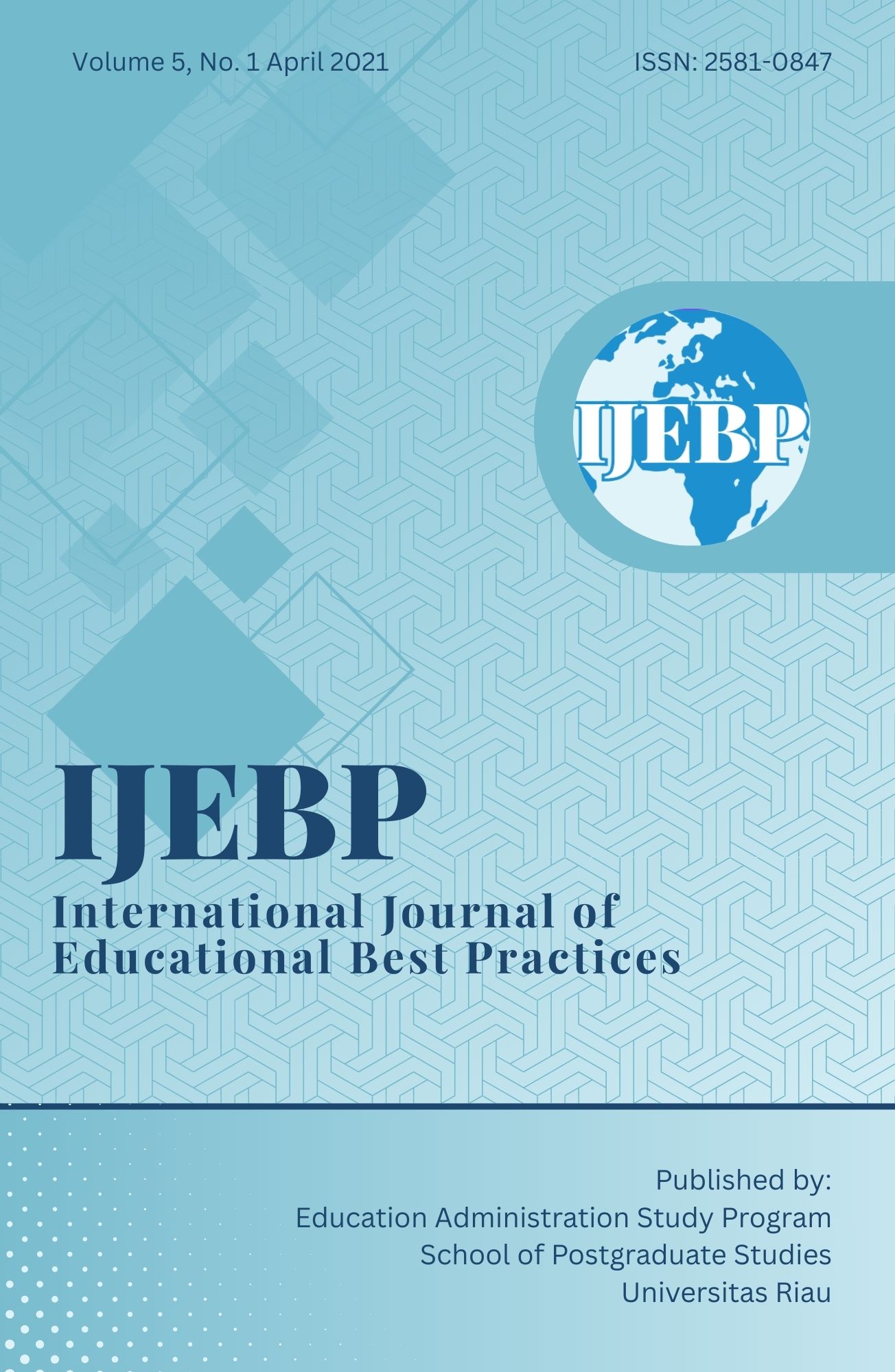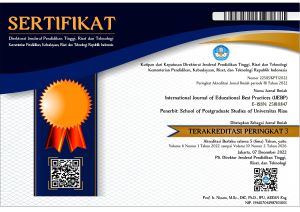THE LEVEL OF PRINCIPAL’S INSTRUCTIONAL LEADERSHIP PRACTICES AND ITS RELATIONSHIP WITH SCHOOL-BASED MANAGEMENT IN SECONDARY SCHOOL IN TUMPAT DISTRICT, KELANTAN, MALAYSIA
DOI:
https://doi.org/10.31258/ijebp.5.1.106-116Keywords:
Instructional leadership, principals, school-based management, education management and administrationAbstract
This study aims to identify the level of principals’ instructional leadership practices and their relationship with the school-based management in secondary schools in Tumpat district, Kelantan. This study was conducted in the form of survey using a quantitative method with a total of 286 respondents using a questionnaire as a research instrument. Quantitative data were analyzed descriptively and inferentially using SPSS software version 25.0. The result of this study showed that the level of principal's instructional leadership practices was high (mean=4.25, s.d.=0.444) where the dimension of forming a positive school environment scored the highest mean (mean=4.30, s.d.=0.459). The level of school based management was also high (mean=4.24, s.d.=0.427) with the highest score mean dimension was the dimension of planning and evaluation (mean=4.29, s.d.=0.450). The Pearson correlation test showed a significant relationship between the level of principals’ instructional leadership practices and school-based management which was at a high correlation level (r=0.895). Therefore, the implication of this study is able to provide an exposure to the Ministry of Education Malaysia who can take initiatives to make improvements in the basic aspects of education and also leadership programs in order to strengthen the leadership practices of principals in schools. This study also has implications to school principals in re-evaluating all their practices and actions in managing schools to further improve the effectiveness and the quality of their administration. In conclusion, this study gives the impression that principals’ instructional leadership practices have impacts on school-based management which to some extent can affect the performance of teachers and students as well as the results of the effectiveness of school functions.
References
Ayob, J. (2005). Pengetua Sekolah yang Efektif. Siri Pengurusan Sekolah. Betong: PTS.
Cheng, Y. C., Ko, J. & Lee, T. T. H. (2016). School autonomy, leadership and learning: a reconceptualization. International Journal of Educational Management 30(2): 177-196.
Dorina, R. (2012). School Climate as an Important in School Effectiveness. Acedemicus- International Scientific Journal. Entrepreneurship Training Center Albania 8: 110-125
Erik, L. (2013). School-Based Management with or without Instructional Leadership: Experience from Sweden. Journal of Education and Learning 2(3): 39-50.
Ferdinand, B. (2009). Manajemen Berbasis Sekolah (Survei Tentang Manajemen Berbasis Sekolah Berdasarkan Prinsip-Prinsip Tata Kelola Sekolah Yang Baik di Sekolah Menengah Atas Negeri 1 Barumun Kabupaten Padang Lawas Medan. Medan: Universitas Sumatera Utara.
Gamage, D.T. (2008). How did School-Based Governance Lead to Distributed Leadership, Partnership and Improved Student Learning. Journal of the Centre for Research in Secondary Schools 7: 27-41.
Gamage, D.T. & Zajda, J. (2005). Decentralisation and School-Based Management: A Study of Self-Governning Schools Models. Educational practice and Theory 27(2): 35-58.
Hallinger, P. (2007). "Research on the practice of instructional and transformational leadership: Retrospect
and prospect". Retrieved research_conference_2007/7/ [13 Mei 2020]. from:
Hallinger, P. (2008). Methodologies for Studying School Leadership: A Review of 25 years of Research Using the Principal Instructional Management Rating Scale. Paper Presentation at the annual meeting of the American Educational Research Association, New York.
Hallinger, P. & Murphy, J. (1985). Assessing the instructional behaviour of principals. The Elementary School Journal 86(2): 217-247.
Jameelaa Bibi, A. & Jainabee, M. K. (2011). Instructional Leadership and Attitude Towards Organizational Change Among Secondary Schools Principal in Pahang, Malaysia. Procedia-Social and Behavioral Sciences 15: 3304-3309.
Jemaah Nazir & Jaminan Kualiti. (2010). Standard Kualiti Pendidikan Malaysia 2010.
Julaihi, B. (1999). Principal’s leadership and school-based management. The case of Sarawak Secondary School. Tesis Dr. Fal, University of Monash.
Kadtong, M. L., Navarro-Parcon, M. & Basar-Monir, L. (2016). School-Based Management in the Operations and Performance of Public Elementary Schools. Proceedings Journal of Education, Psychology and Social Science Research. https://ssrn.com/abstract=3139808 or http://dx.doi.org/10.2139 /ssrn.3139808 [25 Jun 2020].
Karsten, S. & Meijer, J. (1999). School-Based Management in the Netherlands: The Educational Consequences of Lump-Sum Funding. Educational Policy 13(3): 421–439.
Ko, J., Cheng, Y. C. & Lee, T. T. H. (2016). "The development of school autonomy and accountability in Hong Kong: Multiple changes in governance, work, curriculum, and learning". International Journal of Educational Management 30(7): 1207-1230.
McEwan, E. K. (2002). Seven Steps to Effective Instructional Leadership. California Corwin Press. Inc.
Mohd Ibrahim, K. A., Mohammed Sani, I. & Rosemawati, M. (2015). Kompetensi Kepimpinan Instruksional di Kalangan Pengetua Sekolah: Satu Kajian Empirikal di Negeri Selangor. Jurnal Kepimpinan Pendidikan 2(3): 1–14.
Mohd Yusof, A., Baharom, M., Abdul Said, A., Muhammad Suhaimi, T. & Roslee, T. (2012). Kepimpinan Instruksional Pengetua: Cabaran dan Harapan. Utusan Borneo. 8 Februari: 4.
Muhamad Suhaimi, T. & Mazlan, M. (2013). Pengaruh Dimensi Kepimpinan Instruksional Terhadap Komitmen Kerja Guru di Sabah. In: Seminar Majlis Dekan Pendidikan Ipta, 23-25 September 2013, Cac, Uiam.
Pushpanadham, K. (2006). Educational institutions and philosophies, traditional and modern. In S. Wolpert (Ed.). Encyclopedia of India 2: 23-28. Farmington Hills: Thomson Gale.
Reda, I. E. (2015). School-based management: an approach to decision-making quality in Egyptian general secondary schools. School Leadership & Management 35(1): 79-96.
Richardson, A. M. (2007). The Future of Site-Based Management: Principals are the key. Academic Leadership 5(3): 1-7.
Sazali, Y., Rusmini, K. A., Abang Hut, A. E., & Zamri, A. B. (2007). Perkaitan antara kepimpinan instruksional terhadap sekolah berkesan. Jurnal Pengurusan IAB: 107-119.
The World Bank. (2007). What do we know about school-based management? Washington, DC: The World Bank.
Walker, E. M. (2000). Decentralization and participatory decision-making: Implementing school-based management in the Abbott Districts. Research Brief 1(1).
World Bank. (2011). Manajemen berbasis Sekolah di Indonesia. Jakarta: World Bank.





